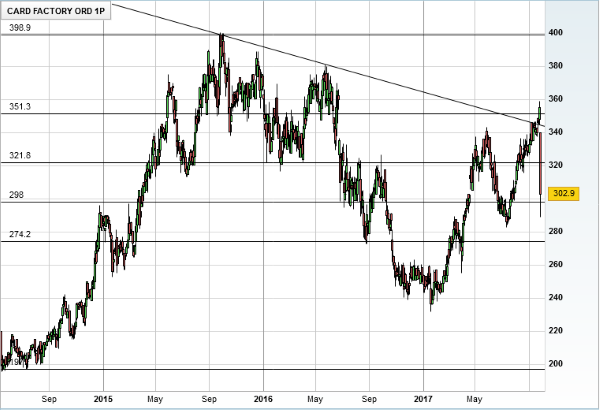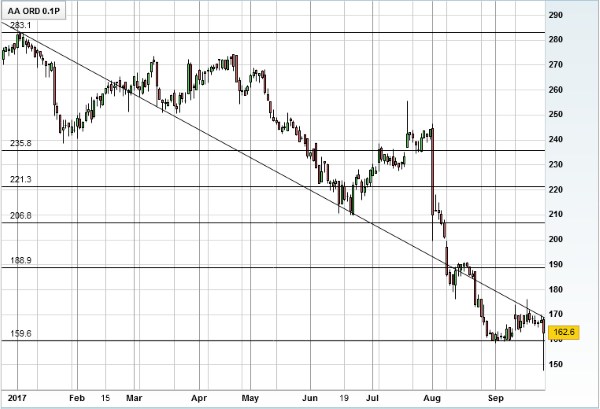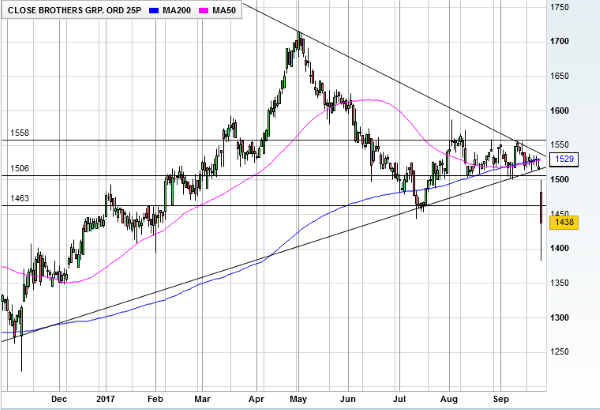This FTSE 250 trio just got punished
26th September 2017 14:13
by David Brenchley from interactive investor
Share on
The market is in an unforgiving mood and bad news has been punished through the summer. And this reaction has definitely spilled over into autumn as a trio of big names found out Tuesday.
and were the biggest fallers on the FTSE All-Share, with close behind as its poor run continued.
Card Factory downgraded
Card Factory was worst hit, with its share price diving as much as 18% on the day to 289p, despite a further special dividend of 15p per share enhancing its ordinary payout of 2.9p.
While sales were up 6% year-on-year to almost £180 million, pre-tax profit dropped by 14% to £23.2 million and underlying basic earnings per share (EPS) decreased by 4% to 6.19p. That's due to a weak pound and higher national living wage, but also as a result of "important investments" into the business.
Full-year cash profit margin is now tipped to fall by 200 basis points versus guidance for a 150bps drop previously, as the outperformance of non-card products remains margin dilutive.

Broker Investec is worried by comments over future capital returns and balance sheet leverage. Management expects net debt to EBITDA leverage, currently running at 1-2 times, to increase given the anticipated profit decline this year.
Analyst Kate Calvert slashed forecasts for full-year pre-tax profit in 2018 and 2019 by 5% and 7.5% respectively, while also cutting future surplus returns to 10p per share.
Card Factory trades on 16 times earnings estimates for 2018, a premium to peers due to high margins and cash generation. "However, the limited profit growth profile near term and uncertainty as to the quantum and extent of surplus capital returns reduces upside near term," says Calvert.
She downgrades the stock from 'buy' to 'hold' and cuts her target price by a fifth to 320p.
AA breaks down again
The AA got stuck in reverse gear again, down as much as 12% dealing a further blow to star fund manager Neil Woodford. He said recently his fund had added to its position after AA shares slumped on news chief executive Bob MacKenzie had been sacked.
Interims weren't too bad, with first-half cash profit of £193 million and adjusted EPS of 10.2p in line with market expectations. The interim dividend is maintained at 3.6p. Woodford's argument was that membership numbers and cash generation look encouraging, and that is still the case.
Interim CEO Simon Breakwell, the founder of Expedia and ex-chief of Uber Europe, was appointed to the role permanently, which pleased analysts.

However, the breakdown specialist further revised down full-year cash profit forecasts, this time to between £390 million and £395 million. It's earmarked an additional investment of £35 million for its prolonged IT transformation – a sensible move according to Barclays' James Rose. "This additional spend should deliver more of that long-promised top-line revenue growth," adds Sandy Chen at Cenkos Securities.
A worrying note for shareholders, according to Rose, is the AA's class A leverage ratio, which could affect the firm's payout. It's currently running at 5.2 times and that could rise to 5.4 times should it only hit the lower end of FY cash profit forecasts. A ratio of 5.5 times would mean the AA is unable to pay a dividend.
Still, both Chen and Rose are positive on the stock with the latter sticking to his 270p target price. The AA currently trades on 10 times EV/EBITDA for FY18 with a 14.5% free cash flow yield, says Rose.
Close Brothers "fairly valued"
Close Brothers was another that saw a steep fall initially – down 9% at a 10-week low - but recovered to trade off around 4%. Prelims for the year ended 31 July saw underlying operating profit up 13% year-on-year at £265 million, above consensus forecasts.
Profits were up across all divisions, but results were driven primarily by Winterflood, its securities arm, with operating profit up 50%. The company said it benefited from "high levels of retail trading activity".
Adjusted basic EPS of 131.7p and DPS of 60p – giving the shares an attractive yield of 4% - were up 3% and 5% respectively year-on-year. The loan book, meanwhile, climbed 7% to £6.9 billion.

This article is for information and discussion purposes only and does not form a recommendation to invest or otherwise. The value of an investment may fall. The investments referred to in this article may not be suitable for all investors, and if in doubt, an investor should seek advice from a qualified investment adviser.